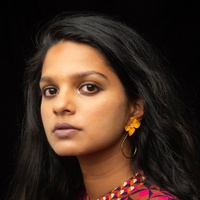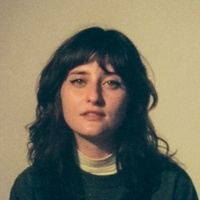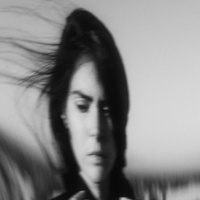On balancing art-making and community activism
Author Sarah Thankam Mathews on bouncing between organizing and art-making, what writing a failed novel taught her, and following the arc of possibility.In 2020, you founded an online community and mutual aid network called Bed-Stuy Strong in response to COVID. I’m curious how community organizing has inspired your creativity, if at all?
It’s an interesting question because I am simultaneously of two minds about it. One way in which I think about it is that the two, for me, are different modes of making and creativity that should be kept separate from each other in terms of some of the things that they’re fundamentally interested in. For example, it feels important to me, at some level, that the art I make does not have to justify itself through some kind of lens of utility, through some kind of argument that it is doing something good in the world. I reserve the right, and want every artist to reserve the right, to make something that’s unconnected to anything that is virtuous or virtuously political.
But the other frame of thinking, which felt particularly true for All This Could Be Different, was that these are two modes of being that spill over into each other constantly as well, and absolutely involve certain essential commonalities, and a view of people as finite in some important ways and capacious and intensely faceted in others.
Something that unites my art-making and my organizing, when I do organizing work, is this view of each person as a wounded but glorious site of possibility. That view of people is something that can hold true within writing novels and going door-to-door, trying to make something happen with other people.
What does your relationship with organizing look like right now?
In 2022, I stepped away from Bed-Stuy Strong where I had a leadership role. I wanted some space to think, to work on being a writer, and just really, frankly, not be in a visible and intensely demanding organizing role, where the question of whether people were getting their survival needs met or not involved my labor. And I only could do that because I felt confident that there were other wonderful people who were going to be at the rudder of things.
Since then, I’ve mostly focused on writing and teaching, with a few exceptions. I did some work related to Palestine liberation in the fall of last year. But now it tends to be a little more project-based. More than anything, I wanted some time and space to heal, to think, and to make new work, which demands a lot. I wasn’t always cognizant of that when I was younger.
I relate to that a lot. In one sense you want what you’re doing to feel like it’s pushing towards something bigger than yourself, but writing can be such a healing space, and a way to have fun too. So, I understand wanting to take that time away.
It’s interesting and complicated, because I think about some of the writers I admire greatly, like Arundhati Roy or Grace Paley. And these were people who really straddled the worlds of organizing and art-making. It’s also not lost on me that [organizing] probably, in some very meaningful ways, had an impact on what they were able to produce in terms of their art. I think on average, if you look at people for whom this is true, they write fewer books. For me there’s no value judgment attached to that. I find both modes of being really so important. And honestly, if you have to choose one, I don’t know that choosing art-making is, I’m using air quotes, “the right one.”
That being said, I think of myself as a writer. That is who I am, that is who I’ve always been. I would be writing if no one paid me to do it, if no one wanted to read what I wrote. That feels like the center of the thing for me. I try to honor that more now in how I allocate my time.
When did you consciously accept that you were a writer? You said you’ve always been one, but I know sometimes it takes a while to really accept that as the truth.
I’ve been writing since I was a child. There were large chunks of my life where I had no idea that being A Writer was a role or job you could have, even as I loved to write. But yeah, writing as an act has been a consistent line under the tightrope walk of my life in so many ways. I think it was in either late 2020 or early 2021 that I started telling other people I was a writer. Before that, I would say something like, “I do X, Y, Z, and I write on the side.” I was fearful of claiming some kind of false valor, which looking back, was silly. Now when I meet people who I sense that hesitant energy from, I move into bossy big sibling mode; I often say, “It sounds like you’re a writer.”
It’s interesting that you didn’t start calling yourself a writer until 2020 or 2021. Didn’t you do an MFA before that?
I didn’t always introduce myself as a writer while doing my MFA because I felt like a student of writing. I was figuring out so much then, about what I thought, about what my aesthetic values and practices were. We’re all living our individual journeys when it comes to this stuff. I’m accepting of the fact that I’m an immigrant child of immigrants and for me it took ten-plus years of practicing and introspection and waiting until the label felt true to myself. To anyone reading this: if you write, you’re a writer, and I’m rooting for you.
I wanted to talk about the novel that you worked on for several years before you started writing All This Could Be Different. Do you think the process of spending so much time with a story that ultimately didn’t really work, aided you in getting to the story that did work? What was that process like for you?
Oh, 100 percent. I don’t think any writing is wasted. The process of writing that failed novel was its own seven-year plus MFA. I came away from it, at first, really bruised and grieving and lost. I did something a bit unwise, that young writers sometimes do, which is to tie the outcome of their hopes of being a writer to a single project. Because they’re not allowing themselves a more expansive ambition than, “I want to publish a book someday. I want to tell this one story someday.” But yeah, Novel Zero, which is what I call that project, taught me everything. It made me face up to certain things that were actually quite difficult to face up to in my life, in my politics, in my ideas about this country, as someone who was a recent immigrant at the time I started writing it. In so many ways it gave me everything except the knowledge that you, as an artist, have when you’re looking at the work, that you’ve made something alive.
When I wrote All This Could Be Different, one of the things that motivated me was defiance and a certain kind of “I’ll show you” anger. Which was tied to the last project. I wrote All This Could Be Different, really keeping in mind a series of rules for myself, very much born from the things that I did with Novel Zero. I just really took a view of all the tactics and approaches I used with that project and said, “Okay, you can do none of these things. Here’s your next round in the ring.”
How do you know when an idea is worth fighting for and when it’s time to give up?
My guess is that each person knows somewhere in their gut. What I want people to do much more of the time is listen to their gut in a variety of contexts. Listen to what your own body is telling you instead of your ego.
It’s really good to do some fighting on the page, or on the canvas, or in whatever editing software you use, depending on what kind of medium you’re working in. It’s really essential to keep in mind the stories and histories of your possibility models, the people who inspire you to make art.
When I was feeling really low, I used to look at this spreadsheet I made that was straight up just a list of the artists I admired and what they were doing at the age I was at the time. Almost always it was something like waiting tables, shooting up, taking care of someone’s mother. It was so comparatively rare for them to have had sexy ascended careers in their 20s, and that was really comforting to me because I felt bombarded by a certain kind of prodigy narrative.
I’m curious about what your writing practice looks like. Are you someone who writes every day and also, how has that changed over time?
In some ways I’m still figuring it out. My working theory is that it differs project by project and life phase by life phase. For five years or so before my MFA, I worked a busy and demanding day job and wrote at night. My general rule for myself was to write every other day, even if it was 200 words at a time. At the MFA, partly because I felt so emotional and stressed as the immigrant child of immigrants, leaving an economically stable life for the lucrative and reliable path of creative writing, I really made myself think of writing as a job and was like, “Apply ass to chair 9:00 AM to 5:00 or 6:00 PM.”
I came away from those years with a certain revulsion for that particular approach. It’s not to say that can’t work for people, and sometimes I get back into it when I’m deep in work on a project. At this stage in my life, I much prefer thinking of writing fiction less as a job and more as something magical I get to invite into my life. That involves discipline and practice, but also something essentially strange and uncommandable and irreducible.
My practice now looks like, functionally, booms and busts. Sometimes I work very intensively and sometimes I will go for weeks without working on writing fiction. I’ll work on other things. I’ll do stuff to make money, or ad hoc, unpaid organizing work. I try to think about things using the metaphor of filling the well. Sometimes I’ll go through periods where I want to have as many experiences as possible, read as much as possible, see as many films as possible, and go out and dance. I think of that as filling a certain kind of sensory well that makes it easier for me to buckle down and write when it’s time.
Since we’ve touched on the MFA program, I have to ask how it’s been for you teaching now at the Iowa Workshop?
It’s been really very special. I went in not knowing what exactly my own experience would be, coming back to this place that for me involved this intense, formative, challenge-filled becoming. But it’s been an honor to get to work with wildly talented writers and to have conversations with them about what it is they’re trying to do, what we think art should be doing, and assembling our own bespoke collages and trees of influence.
I come from an extended family where the most common occupation is teacher, in a variety of roles. There’s been something moving for me, getting to be part of this lineage. I don’t know for sure that I will teach at the university level as my career, as my livelihood, but I do love teaching. There are a bunch of questions I have about that for myself that I’m exploring, but for now I’m grateful to be back and feeling glad for the passage of time.
Since leaving New York and going to this space that’s so drastically different from being in Brooklyn, have you noticed any differences or shifts in your creative process?
It’s interesting because this is not a permanent move. I’ll be back in Brooklyn at the end of Spring. I have found myself really struck by how much it helps my process right at this moment to be living in a place that is chill and quiet. Where there’s stuff to do, but not so much that you’re in this constant state of culture FOMO, of being aware that some of the coolest things happening in the country are outside your door and you could be missing them. I’ve found it really notable how much a certain kind of space, affordability, and general peace has been good for me given the place I’m in right now, which is trying to very intensively get to the finish line of a project.
Who are the writers, artists, organizers, culture workers, inspiring you these days?
There are some writers who have often felt like a certain kind of lodestone, like Toni Morrison, Arundhati Roy, Jamaica Kincaid, and T.S. Eliot. In recent years I found myself reading a lot of David Graeber and Vivian Gornick. I really appreciate how they think.
Let’s see, in my life of late, I’ve been feeling grateful for the work of Sara Marcus, Ayad Akhtar, Silvia Federici, Pankaj Mishra, Sreshtha Sen, Danez Smith, Wendy Xu, and Emily Lee Luan. It’s not only writing that I spend my time with (thank God); of late I’ve been enjoying Maya Varadaraj, Bhasha Chakrabarti, Ghais Guevara, Raqib Shaw, Rachika Nayar, Jacqueline du Pré, Daboor, Humeysha, Terrance Malick, Bong Joon Ho, Trey Abdella, Anna Wehrwein, and Saya Gray. I’ve been particularly into painting, photography, and visual art recently; I think that there’s something about the visual that takes me out of what is dense and knotty in prose; sometimes it can just give me a surface and a feeling to respond to. And I often find myself glad for that sort of switching and moving, in terms of what I’m taking in.
In terms of organizing and culture work, there’s so much of it that’s happening right now that is crucial and exciting, and heartbreaking because of what it’s responding to. But I have found myself so startled and moved by the mass movement for Palestinian rights and safety and life and liberation, in part because it feels so different than how a lot of young people have previously engaged with this country’s foreign policy and its choices. Finally, my closest circle of people inspires me endlessly. Each of them makes me want to continue making work, to keep thinking out loud. They rule. I love them so much.
Sarah Thankam Mathews recommends:
Cooking with others as a social activity
Good and interesting perfume. Some recs here
Using coconut oil in a dental routine, either as a rinse (aka oil pulling) or brushing your teeth with it alongside a conventional toothpaste. Big Dentistry does not want you to know.
Becoming friends with the questions, “Why is this the case?” and “Why does this person think differently than I do?”




